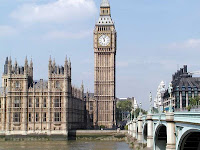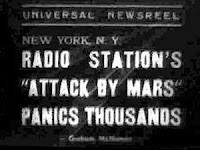 Sirens and bells sounded as victims of the plane crash were rememberedThe body of Polish President Lech Kaczynski - who died along with 95 others when their plane crashed in Russia - has arrived back in Warsaw.
Sirens and bells sounded as victims of the plane crash were rememberedThe body of Polish President Lech Kaczynski - who died along with 95 others when their plane crashed in Russia - has arrived back in Warsaw.It is being given full military honours before taken to the president's palace, where people have been paying tribute.
The president, military chiefs and MPs were due to attend a memorial for a World War II massacre when their plane crashed near Smolensk on Saturday.
Russian officials say the pilots were warned that they were flying too low.
Russian Prime Minister Vladimir Putin earlier attended a memorial service for the victims at the crash site, near the city of Smolensk.
He has said he would personally oversee the investigation into the disaster, promising to find out what happened as soon as possible.
Correspondents say the plane was flying too low and clipped some trees as it approached the runway in thick fog.
A Russian general said air traffic controllers had repeatedly urged the pilots to pull up. Investigators from the Russian emergencies ministry are sifting through the debris for any evidence of mechanical failure.
Church services
No-one survived Saturday's crash, and acting Polish President Bronislaw Komorowski has called for a week's mourning for the dead.
He and Prime Minister Donald Tusk were among the dignitaries to receive Mr Kaczynski's coffin at Warsaw military airport after its repatriation from Smolensk.
After a short religious ceremony, the coffin was due to be driven under military escort to the presidential palace where it will be available for public viewing.
Church services to honour their memory have been held across the country, as has a two-minute tribute, with church bells and police sirens.
The president's twin brother Jaroslaw, the country's former prime minister, travelled to Russia to help identify his body.
The brothers' strong nationalist, conservative agenda divided opinion in Poland, but the BBC's Adam Easton in Warsaw says the president's supporters and opponents have joined together in paying tribute to him.
The president's body was given a full military honours at Warsaw airport
Boguslaw Staron, a 70-year-old from Warsaw, described Mr Kaczynski as "a great patriot".
"He taught Poles how to respect our traditions, how to fight for our dignity, and he made his sacrifice there at that tragic place," he said.
Poles gathered in town squares and in the streets at midday (1000 GMT) and stood silently to mark the tragedy, as church bells rang and emergency sirens wailed around them.
The president had been flying to Russia along with his wife, the heads of the army and navy, MPs and senior historians to mark 70 years since Soviet forces massacred more than 20,000 Poles near Katyn.
Russia has declared Monday a day of mourning and Russian Prime Minister Vladimir Putin, who visited the crash site with Polish counterpart Donald Tusk, said he would oversee the inquiry.
Russian and Polish investigators have recovered the flight-data recorders and are carrying out a joint inquiry.
They are looking into the possibility that pilots ignored warnings that they were approaching Smolensk too low.
Experts have also suggested that the age and condition of the Polish president's Soviet-era Tupolev 154 plane could have played a part in the accident.
Witnesses have described seeing the plane's wing hitting treetops in thick fog before it came down in a forest.
Mr Kaczynski was a controversial figure in Polish politics.
He was active in the Solidarity movement that helped bring an end to Communist rule, but later fell out with Solidarity leader Lech Walesa.
He advocated traditional Catholic values, opposed rapid free-market reforms and favoured retaining social welfare programmes.
As president, he held fewer powers than the prime minister but retained a significant say in foreign policy. He could veto new laws and frequently blocked government reforms.
from bbc








